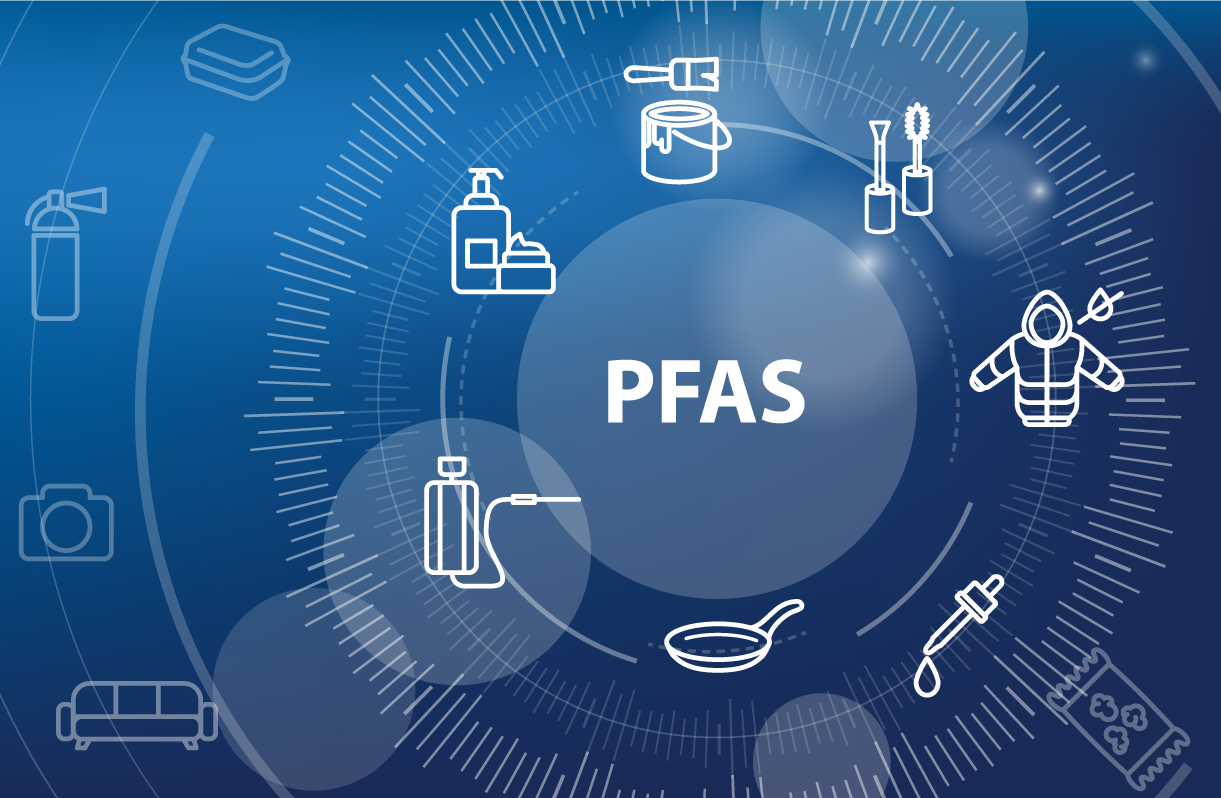On October 27, the US federal Occupational Safety and Health Administration (OSHA) has published an “advanced notice of proposed rulemaking (ANPRM)”, as the first step toward national heat illness prevention rules. This action is the agency’s second recent step to define and combat these hazards – several states already administer such rules. OSHA’s first step was to release new “Inspection Guidance for Heat-Related Hazards” on September 1 (I wrote about it HERE). The remainder of this note summarizes issues raised and questions asked in the ANPRM.
Audit, Compliance and Risk Blog
US Government rolls out comprehensive approach to PFAS “forever chemicals”
Posted by Jon Elliott on Mon, Nov 08, 2021
On October 18, the federal government announced comprehensive plans to design and implement protections against perfluoroalkyl and polyfluoroalkyl substances (PFAS) – often referred to as “forever chemicals.” PFAS have been manufactured and used since the 1940s and are now found in many environmental settings, and most Americans’ blood. These plans were rolled out through statements by President Biden and longer pronouncements by the Environmental Protection Agency (EPA), Department of Defense, Food and Drug Administration, Department of Agriculture, Department of Homeland Security, and Department of Health and Human Services.
The remainder of this note provides basic information about PFAS, and EPA’s new “PFAS Strategic Roadmap: EPA’s Commitments to Action 2021-2024.”
Read MoreTags: EPA, Environment, PFAS, NIEHS
EPA marks the 35th anniversary of Toxics Release Inventory and proposes to list additional chemicals
Posted by Jon Elliott on Mon, Nov 01, 2021
October 17 was the 35th anniversary of the enactment of the Emergency Planning and Community Right-To-Know Act of 1986 (EPCRA, also referred to as SARA Title III). EPCRA presents several separate programs, including release prevention and reporting for a fairly short list of extremely hazardous substances (which I discussed HERE), inventory reporting for most hazardous materials (which I discussed HERE), and filing of annual toxic chemical release inventory reports with the Environmental Protection Agency (EPA) and the state, on one of two forms (Form R or Form A) – usually called the Toxics Release Inventory (TRI) program (which I’ve discussed several times, including HERE).
EPA is celebrating the TRI program anniversary on its website. Meanwhile, the agency has also proposed to add an additional dozen chemicals to the TRI reporting list. The reminder of this note summarizes these activities.
Read MoreTags: EPA, Environment, Toxic, Toxics Release, TRI
SEC emphasizes need for clear disclosure of climate change-related impacts on public companies
Posted by Jon Elliott on Mon, Oct 25, 2021
In September 2021, the Securities and Exchange Commission (SEC) Division of Corporation Finance (Division) provided public companies with guidance about disclosures of climate-related information that SEC expects from public companies. This guidance appears in a newly-released template with sample comments the Division may issue to companies regarding failures to make adequate climate-related disclosure. The remainder of this note provides some context to the relevant SEC-administered provisions, and summarizes the Division’s new letter.
Read More
Tags: SEC, climate change, csr, Environment
Biden Administration Proposes to reverse most Trump Administration revisions to Federal Environmental Impact Assessment rules
Posted by Jon Elliott on Wed, Oct 20, 2021
The federal Council on Environmental Quality (CEQ) has proposed to revise its regulations administering the National Environmental Policy Act (NEPA) of 1969. NEPA requires federal agencies to assess the environmental effects of their proposed actions, and incorporate this information into their decisions. Government-wide guidance is provided by the White House’s CEQ, established by NEPA and appointed by the President. CEQ issues formal regulations that agencies must follow, and guidance documents that provide additional advice. CEQ also reviews agencies’ NEPA implementation programs, and publishes annual national Environmental Quality Reports.
Read More
Tags: Environmental, EPA, NEPA, CEQ
OSHA begins nationwide effort to prevent work-related heat illness
Posted by Jon Elliott on Wed, Oct 13, 2021
In September 2021, the US federal Occupational Safety and Health Administration (OSHA) announced its first steps toward nationwide enhancement of efforts to protect workers from heat illness. The effort will cover both outdoor work in the sun and ambient heat, and indoor work in hot areas or heat-retaining clothing and equipment. OSHA’s first step was to release new “Inspection Guidance for Heat-Related Hazards” on September 1. The remainder of this note discusses this policy, and identifies additional context that clarifies ambiguous points.
Read MoreOn September 23, 2021, the US Environmental Protection Agency (EPA) announced final rules to phase down production and consumption of specified hydrochlorofluorocarbons (HFCs) (I wrote about the proposal HERE). These HFCs are used in refrigeration and air conditioning and fire suppression, and as foam blowing agents and solvents. These rules are consistent with directives included in the 2016 Kigali Amendment to the United Nations-sponsored Montreal Protocol on Substances that Deplete the Ozone Layer (which I wrote about HERE). The US finally enacted statutory support for Kigali-like requirements in the December 2020 coronavirus relief bill (American Innovation and Manufacturing Act of 2020 (AIM Act)), which included dozens of unrelated provisions within its 5,593 pages.
Read More
Tags: EPA, climate change, Environment, HFCs, Montreal Protocol, Ozone Layer
US Federal insurance Office seeking information on climate-related financial risks
Posted by Jon Elliott on Mon, Sep 27, 2021
Organizations around the world are responding to the latest climate-related risk assessment produced by the Intergovernmental Panel on Climate Change (IPCC), which replaced earlier cautionary information with an urgent warning that climate change is “widespread, rapid, and intensifying.” On August 31, the US Federal Insurance Office (FIO), an element of the Department of the Treasury, published a “Request for Information on the Insurance Sector and Climate-Related financial Risks” (RFI) in the Federal Register, posing 19 questions it will use to focus its application of climate-related risks to the domestic insurance sector. Insurers should obviously be interested in these questions and their answers, but any entity that buys insurance should consider them as well. The remainder of this note summarizes FIO’s questions.
Read More
Tags: climate change, Environment, FIO, IPCC, RFI
OSHA narrows procedural protections for employees exercising their rights
Posted by Jon Elliott on Wed, Sep 22, 2021
The Occupational Safety and Health Act of 1970 provides the national framework for worker protections and empowers the Occupational Safety and Health Administration (OSHA) to create and enforce worker protection standards. The OSH Act authorizes states to apply to OSHA for delegation of this authority (referred to as “state plan states”). In addition to these agency actions, however, the OSH Act also empowers the workers themselves to stand up for these rights, and to complain to agencies when they believe their rights are being violated. Beginning in 1973, OSHA has promulgated regulations formalizing employee rights to be free of adverse actions by their employers – “discrimination” in the language of the law and regulations – for exercising their rights to self-protection (codified in 29 Code of Federal Regulations (CFR) part 1977). Effective September 3, 2021, OSHA has updated these part 1977 regulations to track US Supreme Court decisions that tend to narrow employee rights somewhat. The remainder of this note summarizes OSHA’s part 1977 regulations and discusses the latest revisions.
Read More
Tags: Health & Safety, OSHA, Safety and Health at Work, workplace safety, anti-retaliation
WorkSafeBC – COVID-19 safety plans shift to communicable disease prevention
Posted by BLG’s Labour and Employment Group on Tue, Sep 14, 2021
British Columbia moved into Step 3 of the BC Restart Plan on July 1, 2021, and one of the main implications for employers is a shift from COVID-19 safety plans to general communicable disease prevention. WorkSafeBC has released its guidance on communicable disease prevention, and employers should be adapting their COVID-19 safety plans to communicable disease prevention with this guidance in mind.
Read MoreTags: Business & Legal, Employee Rights, Covid-19, Employment Law, Labour & Employment, British Columbia, BC Restart Plan, Communicable Disease Prevention










